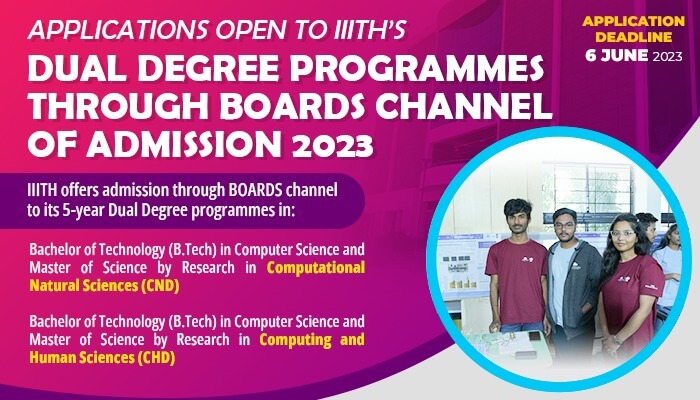Class 12 Humanities students with high Mathematics scores can apply directly to a Dual Degree programme bypassing the traditional JEE.
For long, high school students aspiring for a higher education had to face a difficult and rigid trade-off between the Sciences and Humanities. But equal demand from students and the industry alike for “well rounded” graduates is witnessing the disappearance of such fixed compartments in higher education. While top tier institutes like the IITs and IIITH have been offering courses in Philosophy, Sociology and English since inception, the trend fuelled by the NEP 2020 emphasising a “holistic and multidisciplinary learning” approach has been catching on with other universities too.
Integrating Engineering With Liberal Arts
“International Institute of Information Technology Hyderabad (IIITH) started offering programmes that integrated Computer Science with other disciplines about two decades ago,” recounts Prof. P J Narayanan, Director, IIITH. The cross-disciplinary dual degree programme initially started as a Computer Science with Linguistics offering, expanded to Computer Sciences with Natural Sciences and then a Computer Science degree in combination with Humanities. This interdisciplinary programme which is in its 5th year of offering was revised and refurbished in 2018 and is now called a BTech in Computer Science and Master of Science by Research in Computational Natural Sciences (CND)/Computational Linguistics/ Computing and Human Sciences (CHD). In this, students opt for an equal number of Computer Science and Human Sciences courses over a 4 year period and in the 5th year, they are required to do research culminating in a Masters thesis. A thesis submission typically mandates two publications in international quality journals or conferences.
Living In A Multi-Disciplinary World
Explaining the rationale behind such a programme in the first place, the Director says, “Graduates of Computer Sciences or Computing are overwhelmingly involved with the building of systems and tools that are used by a large section of people who are not technologists. Consider mobile apps that are ubiquitous or social media systems used by the larger populace. As a result, such systems must be designed with the larger humanity in mind. The technology students of today who will be designing and building such systems in the future need to be aware of how humans as individuals and as members of society may use them. They should be given sufficient depth of understanding to make systems that are fair, equitable and just, besides being easy to use. Plus, it is now impossible to study Humanities and Social Sciences without help from CS methods and tools. Thus, it makes sense for Human Sciences scholars to be able to work, create and innovate CS tools and methods at the highest level of competence.”
Novel Admission Channel
With no other academic programme in the country allowing undergraduate students to gain equal and high level of proficiency in both Computer Science and Human Sciences at the same time, it makes the offering by IIITH extremely unique and pioneering. In fact, in order to encourage more students with a Humanities and Social Sciences background to learn Computer Science, the institute has announced a novel and innovative admission process for those who have studied Humanities and Social Sciences in their senior secondary level (Grade 12) with expertise in Mathematics as demonstrated by their scores in the latter. “This takes inspiration from the NEP and is clearly the first ever that a university in India is opening up CS (or any engineering course) to students who have not done PCM in school,” states Prof. Aniket Alam, programme coordinator of these dual degree programmes.
12th BOARDS Matter
Candidates who have obtained high scores in Class 12 Board exams of any Central or State Board are eligible for this special mode of admission into the Dual Degree Programme. If applying for the Computational Natural Sciences programme, they must have scored 90% or more in Maths, Physics and Chemistry, while for the Computing and Human Sciences programme, an 85% minimum eligibility is mandatory in Maths and any one of the following subjects, History, Political Science, Geography, Economics, English Elective and Sociology. In appreciation of their distinction in the exams, top applicants will be shortlisted and invited directly for an interview. The Maths referred to above applies to the standard Maths course with Calculus as a component and does not consider Business or Commerce Mathematics.
Changing Wind
In a sign that students are actively looking to eschew traditional disciplinary boundaries, Prof. P J Narayanan mentions that the numbers of applicants to the Dual Degree programme in Humanities is only increasing over the years. “The response has been very positive. Last year out of a total of about 20,000 who applied to the BTech and MS dual degree programme, over 2,000 students applied for the Human Sciences dual degree. This year the admissions are yet to finish, but the numbers have increased significantly.” With the additional thrust given to those coming from the Humanities and Social Sciences background by way of the new BOARDS channel of admission, Prof. Alam says, ”This is a small, but dare I say, revolutionary step to liberalise higher education and free it from the clutches of rote learning and education mafias which treat students like sheep and education like a factory.”
For more information on the BOARDS mode of admission, click here.

Sarita Chebbi is a compulsive early riser. Devourer of all news. Kettlebell enthusiast. Nit-picker of the written word especially when it’s not her own.


Very interesting. However many students opt for Humanities because Mathematics is not their forte. Are there any option in IIT to pursue undergraduate courses with Humanities background
Malathi Iyengar says:My son got 79.13% in state board but in jee mains 97.2%tile , can he eligible for this dual degree program
Geeta Patel says:He got 90 marks in maths, 74 in physics, 75 in chemistry, please reply. Sorry for another comment
Geeta Patel says: